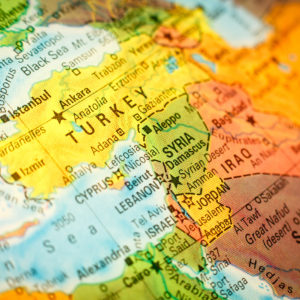In Kobani, Syrian Kurds fought to the death against ISIS for five months. On the third week of battle, the United States came to their aid with air strikes. On January 26, 2015, the ISIS jihadists retreated.
The Siege of Kobani became known as the “Stalingrad of Islamic State.” It was the territorial high-water mark of the so-called caliphate, which shrunk thereafter under attack from the Kurdish-led Syrian Democratic Forces (SDF) on the ground and the U.S.-led coalition from the air. Eleven thousand SDF soldiers died in that campaign, as did 10 Americans.
Now Kobani will be besieged again, if it has not been already by the time of this written, this time by Turkey. Though it will probably resist again, this time it will probably fall. Once it falls, it will be occupied. Once it is occupied, it will be repopulated — but not by Kurds.
The Turkish government has made clear its plan to settle Arab refugees throughout the Kurdish-majority corridor along Syria’s northeastern border. Turkey has incredulously declared that area a “safe zone” for those refugees. It is unclear how “safe” the zone will be for those Kurds who remain after the Turkish army has smashed their resistance with tanks, air strikes and artillery.
If this Turkish offensive becomes a thinly veiled exercise in ethnic cleansing, Turkish president Recep Tayyip Erdogan will bear the ultimate moral responsibility for it. But history will remember President Donald Trump’s order withdrawing American forces from the area, at Erdogan’s urging, as the decision that allowed it to proceed.
Erdogan justifies his action by claiming that the Kurdish YPG militia, which forms the core of the SDF, is linked to the PKK, a Kurdish separatist group that has fought the Turkish state for decades and has at times resorted to terrorism. He is not entirely wrong. Scrutiny of YPG leaders reveals extensive personal connections to the PKK. Nor is the YPG’s rule in northeastern Syria saintly, though it is arguably preferable to the alternatives on offer in the region.
But purging Syria’s Kurdish population is no way to ensure Turkey’s security. It is merely a way for Erdogan to recover his prestige after the Syrian dictator Bashar al-Assad and Russia assaulted Syria’s western Idlib province this summer, over his feeble objections.
Unfortunately, Erdogan has put his pride before the safety and survival of millions, including his own countrymen. In 2015, after failing to win a majority in parliament necessary to pass a constitutional amendment giving greater powers to the presidency (the office he now holds), he reignited Turkey’s insurgency by cutting off peace negotiations with the PKK. The resulting violence generated enough nationalist sentiment for Erdogan’s party to win a re-run of the election.
The United States has failed to prevent tragedies before. That is a sad and sometimes unavoidable part of being a great power. But this is no Rwanda, where we were faced with the difficult question of taking on a new, open-ended commitment to stop a country from tearing itself apart.
This time, we were already there. No new commitments were required, and we could have upheld our existing ones to both Turkey and the SDF by simply staying put. Our influence had kept the SDF from attacking Turkey, and would have continued to. Our presence, however small, had deterred Turkey from attacking the SDF, and would have continued to deter it, no matter the big talk from Erdogan. He knew that the United States is stronger than Turkey, and that we would not allow our friends to be slaughtered. Until now.
Whereas with Rwanda we were accused of neglect, with the Kurds we shall be accused of betrayal. We had fought side by side with them. They had borne the battle against ISIS, and relied on us to shield them from the other wolves that stalk the region: Assad, Russia, Iran and Erdogan.
This decision to withdraw is a dark stain on our country’s reputation. And its effect might not be limited to the immediate consequences. Should Erdogan succeed in rearranging northeastern Syria’s demography, he will have set the stage for another tragedy. Once a thin ribbon of transplanted Arabs separates two large Kurdish populations, what will happen if Turkey someday loses its grip, and an embittered YPG gains the upper hand? Then vengeful Kurds would be the villains, and innocent Arabs, whom Erdogan used as his pawns, the victims. But the United States would still bear a damning portion of the responsibility.
Our honor demanded better.

